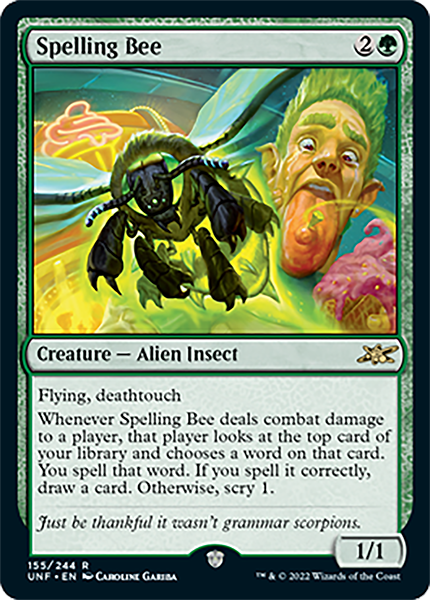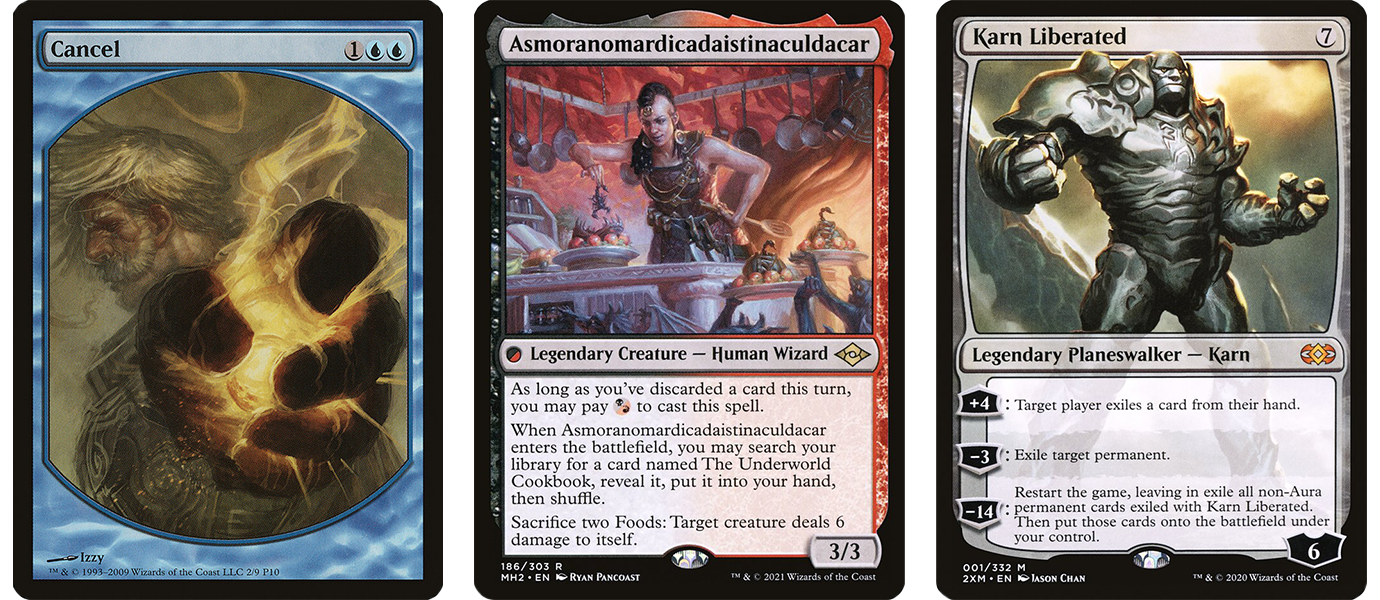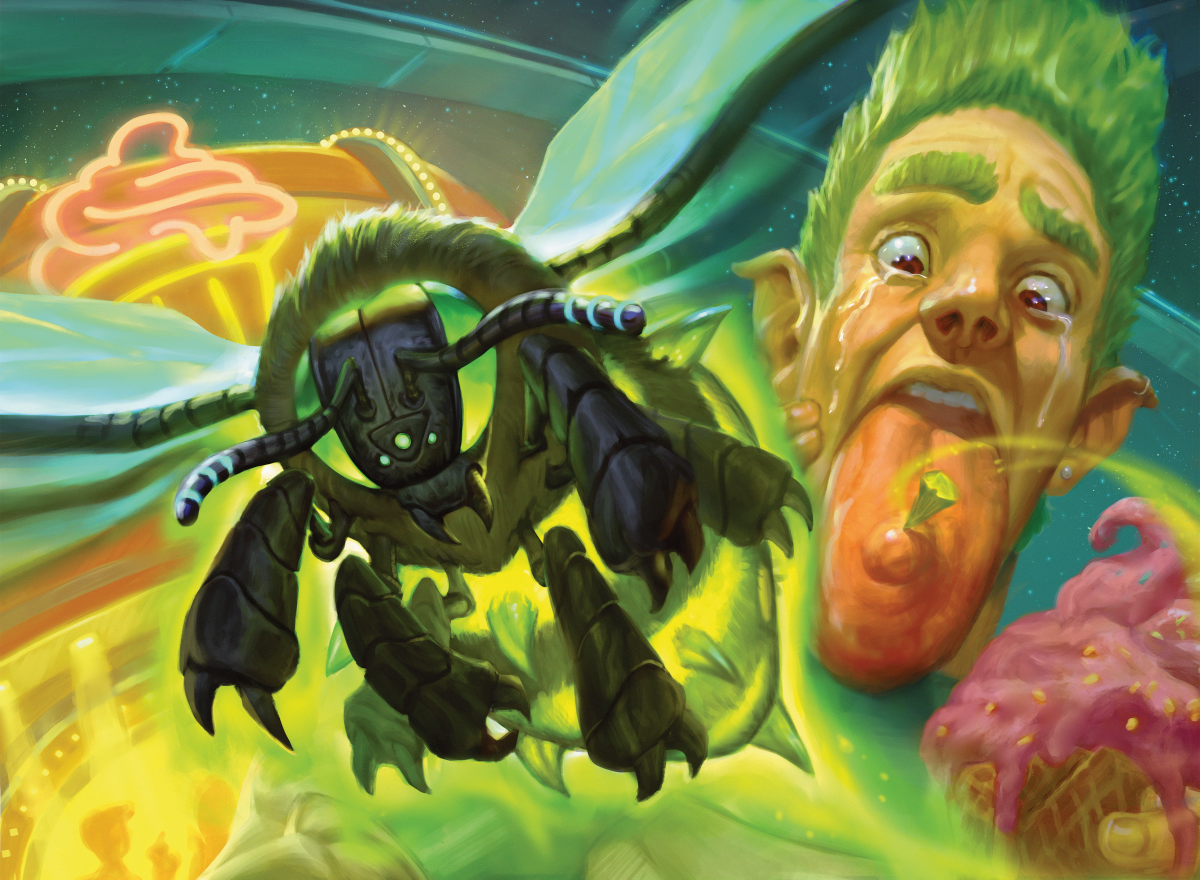There’s absolutely no reason to drag this on, so let’s just get to why you’re here! Introducing: Spelling Bee!

The Acorn of It All
Now, as a judge, I have a contractual obligation to get a little technical…
Spelling Bee has an acorn stamp where the standard oval stamp would appear. Acorn stamps mean that you should discuss the use of acorn cards in general (or the card you want to play in particular) before starting to play in a casual game and that they are not legal in tournament play. However, there are going to be a ton of cards in Unfinity that are just a little bit weird and absolutely tournament legal.
Acorn cards, however, don’t necessarily fit within the rules, which can present a little bit of a challenge for Judges who do want everything to fit neatly into the (as of this recording) 266 pages of the comprehensive rules.
So this is where I get to execute my judgment! Let’s talk about ways to break this card – either playing with it or playing against it!
What Is a Word?
What is a word? This is a kinda strangely difficult question to answer. The Magic rules define numbers (they don’t necessarily always work as you would think), colors (there are five!), heck it even defines what a player is!
It doesn’t actually define words, but they do come up quite a bit in sections 612 “Text-Changing Effects” and 613 – “Interaction of Continuous Effects” or more colloquially “Layers”, but still no definition of words. Some cards, like Magical Hack (or slightly more recently, Trait Doctoring) can change a “color word” or “basic land type”, but there are still plenty of other words not covered by that.

Words have come up before on other un-cards, but they usually are words in a specific place on a card (either in the name or in the text box) or just words in general, which can be a bit easier to define.
Acronyms and abbreviations (like UNF for Unfinity or NEO for Kamigawa: Neon Dynasty) aren’t words. Neither are symbols (™) or numbers (2022). Names, however, including an artist’s name… that’s fair game. At least, that’s my take on it, using a general definition of “word”. But you can and should use your judgment to determine what’s fair and fun, especially when playing with Acorns!
Playing With Spelling Bee
That’s enough about the rules, how about breaking them? My first tip for playing with Spelling Bee? Full Art cards! For example, the textless version of “Cancel” has the words “Cancel”, “Izzy” and “Wizards of the Coast” – relatively easy to spell all of those!
It definitely does encourage you to play with simpler cards like Doom Blade or Lightning Bolt, and fewer cards with complex names, like Asmoranomardicadaistinaculdacar. But maybe you just really like that particular chef and know how to spell her name, so you can actually probably get most of your opponents to pick that word, and then show off your ability to spell it.
You can also try to be a show-off and have as many different words on your cards as you can, so you can try to identify what card is on top of your deck, just for the extra style points. If your opponent has you spelling “restart” that’s gonna be a Karn on top of your deck! Of course, you’re drawing the card or scrying immediately anyways, but the point is to send a message.

Similar, But Different
Now, if you’re playing against the Bee and you really want to toy with your opponent when they put you in the role of master of ceremonies for the Spelling Bee, you can always try to trip them up with some homonyms. The words “there”, “their” and “they’re” all sound the same and all show up on Magic cards.
If you really want to rub it in, and you know that they’re running some Dungeon cards or Tamiyo and Ajani, you can toss the classic pair of “Completed” and “Compleated” at them, and see which way they try to go!

Polyglot
There’s also some fun to be had if you’re playing with cards in multiple languages! While Unfinity is only being printed in English, that doesn’t mean the rest of your deck has to match. There are plenty of words that sound the same in two different languages and have the same meaning – (so they’ll appear on the same cards), but have different spellings. For example with the right accent or poor enough pronunciation – Fire in English and Feuer in German sound somewhat similar and if you’re playing a burn deck with the word fire in a lot of flavor text, you might not be certain which way you need to go!
Similarly, the word for “library” which you’ll certainly see on a lot of cards has very similar pronunciation in many languages that aren’t English, but often different spellings!
There Are Always More Rules
We could continue to make up rulings for a card that hasn’t been released yet and that is unlikely to be inducted into the Comprehensive Rules, but instead, we’re just going to call it there!
Magic Judges are group members of the larger Magic community with a passion for the intricacies of the rules, creating welcoming communities, and engineering smooth and enjoyable tournaments and events.
If you’re interested in becoming a judge and diving into understanding things like how numbers really work or what “player” is, or even more complicated elements such as how a spell is technically cast we welcome you to join us and start your path towards becoming a certified Magic Judge! You can register and start learning today!
If you have any questions about the judge program or want to explore the community a bit, you can engage the judge community on the Judge Academy Discord or reach out directly to questions@judgeacademy.com




